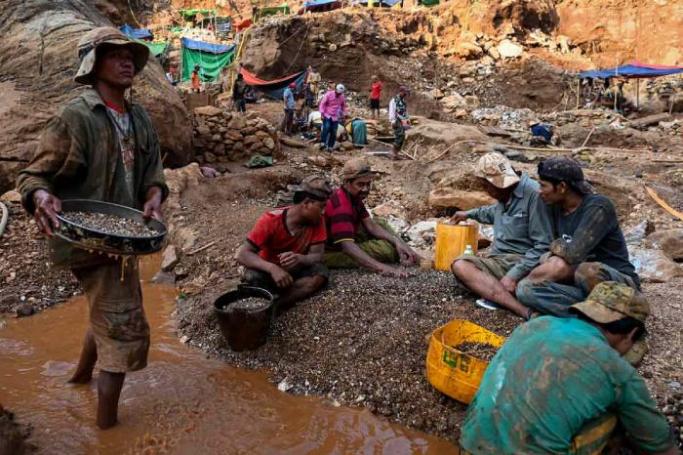In the aftermath of the military coup in Myanmar, illegal drug abuse has surged in a nation grappling with weak law enforcement.
Since the coup, there has been a significant increase in drug use among mine workers in Mogok, Mandalay Region—a stark contrast to the previous scarcity of drug sellers and lower usage rates, according to a Mogok resident.
"Many mine workers are toiling away in the gem mines here, some of which have pits that plummet thousands of feet into the earth. Once the workers descend into these pits, it becomes very difficult to ascend and descend frequently. Consequently, some miners resort to drug usage and remain within the pits for extended periods,” said the Mogok resident on the condition of anonymity.
“Since the coup, there has been a remarkable surge in drug consumption in Mogok mines. In the past, acquiring drugs was not a straightforward task, as there were not many sellers, which deterred mine workers from using them extensively. However, the situation has changed, with approximately 90 out of every 100 mine workers now involved in drug use."
In Myanmar, with a declining economy and limited employment prospects, numerous people have been forced into arduous, often exhausting, and sporadic work just to make ends meet. To endure the physical toll of such labour, some turn to drug use while working, according to observers.
The illegal drug most frequently used by Mogok mine workers is Ya Ba tablets, a drug containing a mixture of methamphetamine and caffeine, said the Mogok resident.
"The sellers are no longer being arrested, so they sell the drugs openly. Ya Ba tablets are primarily sought to provide users with a sense of revitalization. On average, a mine worker typically requires around 8,000 Kyat per day (approximately US$1=3,300 Kyat) for drugs. Some workers discontinue their use upon leaving the mining job, but others cannot stop their use," said the resident.
The cost of a Ya Ba tablet, popular among young people, has dropped from approximately 2,000 Kyat per pill to roughly 1,000 Kyat. Similarly, the price of the highly addictive illegal drug Ice, also known as crystal meth, has plummeted from 60,000 Kyat per gram to just 30,000 Kyat.
Substances like K (Ketamine), E (Ecstasy), and Happy Water (a mixture of K and E), known as party drugs, have gained popularity among young people. These psychedelic drugs are easily available in KTV bars and nightclubs.
"These drugs are popular and can be used at major nightclubs, which may bribe the military junta. Some nightclubs sell these drugs, while others don't sell them but allow people to use them. Most of the drug users are young people of all genders," a young Yangon resident told Mizzima.
The majority of nightclubs and bars where drugs are readily accessible are reportedly owned by relatives and associates of high-ranking military officers.
A source close to the junta army has alleged significant military involvement in drug trafficking in Myanmar.
According to a survey conducted by the Institute for Strategy and Policy Myanmar (ISP) across 110 townships in Myanmar from May to July 2023, 93 of them reported easy access to drugs.












